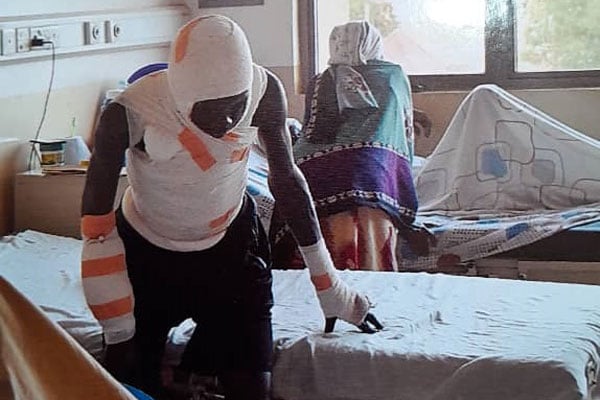Government cautions importers on exorbitant charges on assistive devices for PWDs

Some of the children with disabilities using wheelchairs made out of bicycle spare parts and bamboo. Photo/Jane Nafula
What you need to know:
- Assistive devices include wheelchairs, crutches, white canes, orthopedic appliances, hearing or visual aids, braille machines, adjustable beds and seats among others.
- Participants revealed that a wheelchair for example costs over Shs1 million while a cochlear costs over Shs50 million.
The Third Deputy Prime Minister, Ms Rukia Isanga Nakadama, has cautioned importers of disability aids and equipment against charging high prices, despite government granting them tax waivers.
In her address to participants attending a three-day 7th Community Based Rehabilitation (CBR) / Community Based Inclusive Development (CBID) Africa Conference held at Entebbe on September 13, Ms Nakadama said the cost of such aids should be affordable to improve the functional capabilities of persons with disabilities.
The conference was held under the theme, “Advancing Community Based Rehabilitation and Community Based Inclusive Development for a Disability Inclusive Society.”
"When government grants you tax waivers, its intention is to make the Assistive products affordable," she asserted.
Assistive devices include wheelchairs, crutches, white canes, orthopedic appliances, hearing or visual aids, braille machines, adjustable beds and seats among others.
During the conference, participants revealed that a wheelchair for example costs over Shs1 million while a cochlear costs over Shs50 million.
A cochlear implant is an electronic device that improves hearing among people with severe hearing loss following inner-ear damage.
Available statistics indicate that persons with disabilities constitute 12.4 percent of Uganda' national population.
Ms Hellen Asamo, State Minister for Disability Affairs said great strides have been made in developing technologies that assist persons with disabilities to go about their routines but access to such products remain a challenge.
Ms Asamo called for collaboration in availing such devices to the needy persons with disabilities to improve their productivity levels.
The 2022 World Health Organisation (WHO) and United Nations Children Fund (Unicef) report on assistive technology indicated a considerable inequality in access to assistive technology, with only 3 percent of the population in low -income countries being able to access them compared to 90 percent in some developed countries.
Mr Chris Ninsiima, Programs Director at Uganda National Union for Disabled Persons of Uganda (NUDIPU) recommended local production of some of the devices.
“Once these are available, persons with disabilities, including school children will re-build independent lives, and access services that the need,” Mr Ninsiima said.
Ms Fiona Beckerlegge, Chief Executive Officer and Co-Founder of Kalinga Child Development Centre in Fort-Portal, Western Uganda disclosed that the organisation had embarked on using locally available materials to make wheelchairs.
“It’s really difficult to get wheelchairs suitable for the African terrain. The few that we are able to get were expensive, don't fit the children well and break very easily. We are now making them out of bamboo and bicycle spare parts,” Ms Beckerlegge said.
Each wheelchair costs about Shs1.8 million, but according to Ms Beckerlegge, the price will drop once they venture into larger production.
Mr Samuel Mwanguhya, a father to Monica Katugume, eight-year-old girl with disability said the donation of a wheelchair to her daughter, has relieved him of daily expenditure on her transport.
“I have been paying Shs20,000 to a bodaboda to take her to school per week. Monica can't stand, she can't walk, she was going to school on a boda-boda, and while there, she could crawl around in the dirt,” Mr Mwanguhya said.
Meanwhile, the government of Uganda has launched the Community Based Disability Inclusive Development Strategy (CBDID) 2025-2035.
CBID is a development strategy which aims to ensure that people with disabilities are respected and included in their communities on an equal basis in all areas of life.




